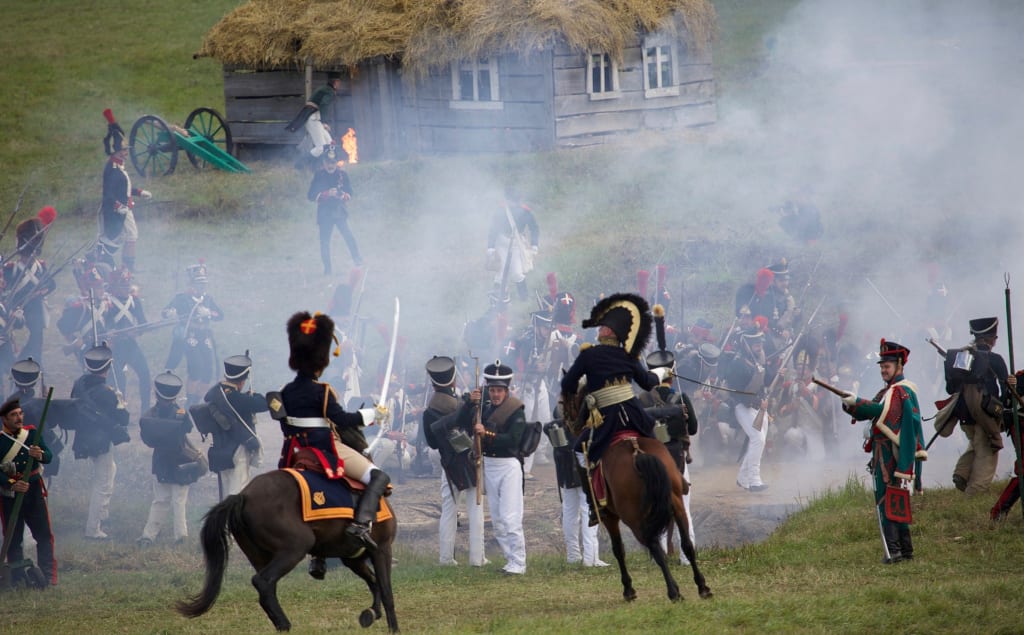Napoleon Bonaparte: A Tale of Ambition and Destiny
The Rise, Reign, and Fall of a Military Genius

Napoleon Bonaparte, one of history’s most iconic figures, was born on August 15, 1769, in the Mediterranean island of Corsica. From these humble beginnings, he would rise to become a military genius, a ruler, and a symbol of an era. His life can be divided into key phases that marked his ascent and eventual fall.
Early Life and Military Ascent
Napoleon’s early years were profoundly shaped by the tumultuous times of the French Revolution. As the Corsican-born son of minor nobility, he was sent to mainland France for his education. It was there that he acquired the French language and the ambitions that would drive his later career. In 1785, at the age of 16, he received a commission as a second lieutenant in the artillery, marking the beginning of his military journey.
The French Revolution and Rise to Power
The French Revolution, which erupted in 1789, created an environment of radical change and opportunity. For an ambitious young officer like Napoleon, it provided fertile ground to make his mark. He initially supported the revolutionary cause and gained recognition for his role in the capture of Toulon, which was under British control. This victory not only revealed his military prowess but also his loyalty to the revolutionary government.
Napoleon’s career reached a turning point in 1795 when he played a crucial role in quelling a royalist uprising in Paris. This event, known as the 13 Vendémiaire, showcased his tactical skills and unwavering commitment to the revolutionary government. His success catapulted him to the rank of general, and he soon became the head of the Army of Italy.
The Napoleonic Wars: Conquests and Alliances
Napoleon’s military campaigns, known as the Napoleonic Wars, are legendary. They were marked by his extraordinary strategic and tactical brilliance. His victories include the Battle of Austerlitz in 1805, where he defeated a combined Russian and Austrian army, and the Battle of Jena-Auerstedt in 1806, where he triumphed over the Prussians. These successes were emblematic of his military genius and marked the height of his power.
During his reign, Napoleon continually expanded the French Empire. He made strategic alliances, such as the Confederation of the Rhine, which included several German states as his allies. His expansionist policies and diplomatic maneuvering extended French influence across Europe. He created client states and reorganized regions to suit his imperial vision.
Reforms and the Napoleonic Code
Napoleon was not merely a conqueror; he was also a visionary leader. Throughout his rule, he implemented a series of reforms that had a profound and lasting impact on France and the world. One of his most enduring contributions was the Napoleonic Code, also known as the Civil Code. This comprehensive legal system modernized and standardized laws, ensuring equality before the law and property rights. The code’s influence extended beyond France, becoming a model for legal reform in various countries and regions.
The Downfall: Russian Campaign and Exile
Despite his impressive successes, Napoleon’s ambition and expansionist policies eventually led to his downfall. The ill-fated Russian campaign in 1812 marked a significant turning point. The invasion of Russia turned into a catastrophe as the Russian winter and scorched-earth tactics decimated his Grande Armée. Forced to retreat, Napoleon’s power began to wane.
In 1814, with his enemies closing in on Paris, Napoleon was forced to abdicate as Emperor. He was exiled to the island of Elba in the Mediterranean, and the Bourbon monarchy was restored in France.
The Hundred Days and Waterloo
Napoleon’s exile was not the end of his story. In 1815, he managed a daring escape from Elba, returning to France for a brief period known as the Hundred Days. His return created a resurgence of support, but his ambitions were thwarted at the Battle of Waterloo in June 1815. Facing a coalition of European powers, Napoleon suffered a decisive defeat, marking the end of his rule.
Exile to Saint Helena and Legacy
After his defeat at Waterloo, Napoleon was exiled once more, this time to the remote island of Saint Helena in the South Atlantic. There, he lived in relative obscurity, writing his memoirs and reflecting on his life and legacy. On May 5, 1821, Napoleon Bonaparte passed away, but his influence lived on.
Napoleon’s Legacy
Napoleon Bonaparte’s legacy is a subject of debate and fascination. Some view him as a hero who brought stability and legal reform to a continent ravaged by the French Revolution. Others see him as a power-hungry conqueror who brought war and destruction to much of Europe. Regardless of one’s perspective, Napoleon Bonaparte’s life and career remain an enduring subject of historical study and intrigue.
In Conclusion
Napoleon Bonaparte’s life is a remarkable tale of ambition, military genius, and the complexities of leadership. His legacy endures, and his story continues to captivate those interested in the pages of history. Whether admired or criticized, he remains an iconic figure in the annals of history, a testament to the enduring impact of one individual on the course of nations.
About the Creator
Alpha the great
As a writer, my voice is the pen, crafting stories that resonate with the depths of your soul. Each tale is a journey, guided by the melodies of imagination and heart,With lyrical prose and a storyteller's soul.






Comments
There are no comments for this story
Be the first to respond and start the conversation.